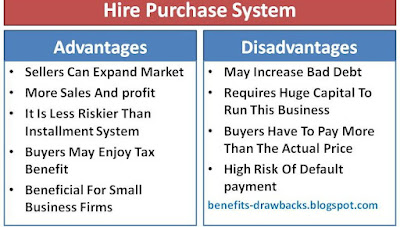What Is Debt Financing ?
Debt financing is just opposite of equity financing.(in which capital is raised by selling equity instruments to the investors). It is a process of raising fund by selling debt instruments such as bond, credit cards, debentures etc. It is a borrowing of money and should be paid back with interest. In this post we are going to discuss some major pros and cons of debt financing.
Advantages Of Debt Financing
The main advantages of debt financing can be pointed out as follows:
1. Ownership And Control
One of the main advantages of debt financing is that it does not dilute ownership and control like in equity financing. Ownership, management control remains with the company because lenders have no right to manage the company.
2. Decreased Tax Obligation
Debt is considered as expenses in business. So, interest on loan is tax deductible. So, it minimizes the tax obligation.
3. No Share Of Profit
Another benefit of debt financing is that company can enjoy entire profit because lenders cannot claim on the profit of the firm.
4. Improves Credit Rating
If a firm pays loan and interest on time, it improves the credit rating of the business, It increases the reputation and image of the company.
5. Flexibility
It is more flexible than equity funding. There are several debt instruments such as loan, debenture, bills, credit card etc. Companies can choose best debt financing option as per the nature of the business.
Disadvantages Of Debt Financing
The main drawbacks or disadvantages of debt financing are as follows:
1. Impact On Cash Flow
As we know that certain amount of loan and interest should be paid in each month until the last installment, it may negatively impact cash flow. It may hamper daily operational activities because of lack of adequate working capital.
2. Complex Process
It is difficult to raise capital with debt financing. It requires strong credit history to attract lenders. So, it is not suitable for small and new business firms.
3. Need Of Collateral
Another disadvantage of debt financing is that company may need to provide collateral (fixed assets such as land, building, machinery) etc. to secure loan. If the company fails to repay the loan lenders can acquire the assets.
4. Strict Discipline
It requires strict discipline to repay the loan. If a firm fails to repay the loan on time it negativels affects the credit rating and image of the firm.
Also Read
Advantages and disadvantages of equity financing
5. Not Suitable
Debt financing is not suitable for the business having inconsistent cash flow because it make difficult to pay the loan and interest regularly.
Pros And Cons Of Debt Financing In Short
Pros
- Firms retain ownership and control
- It increases the credit rating of the firm
- Firm can enjoy 100% profit
- It decreases the tax liability
- Liability is over after paying the loan
Cons
- It is risky and complicated than equity financing
- It may impact cash flow of the firm
- Firms may have to pay high rate of interest
- It is not suitable for small business
- It requires collateral to get loan














